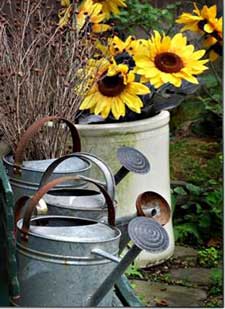Campus Gardening Tips for University of Florida Students
Kevyn Juneau, IPM Florida
Gardens come in various types, including both those planted in the ground or in pots and planters. Many people on campus grow plants as a hobby or for food. By following some helpful tips you, can reduce the number of pests that eat your plants or invade your apartment. Also, by planting certain flowers and herbs you can attract butterflies and birds while attracting beneficial insects, such as ladybugs and lacewings that eat pests.
- Plant native flowers and shrubs: Native plants tend to be more resistant to pests and diseases, and are more tolerant of our hot, humid climate. Therefore, native plants are easier to maintain! Visit the Florida Yards and Neighborhood's website for more information on native plants:.
- Attract beneficial insects to your garden: Beneficial insects, such as ladybugs,lacewings, damsel bugs, and predatory wasps, eat pest insects that attack your garden. You can plantvarious flowers and herbs to attract beneficial insects. Learn more about beneficial insects by visiting IPM Florida's home gardening page: IPM Home Gardening.
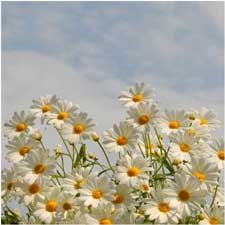
Plants that attract beneficial insects |
|
Yarrow |
Dill |
Sunflowers |
Parsley |
Fennel |
Coriander |
Daisies |
Thyme |
Rosemary |
Mint |
- Attract butterflies to your garden: You can attract many kinds of butterflies by planting flowers and herbs on which they feed or reproduce. Butterflies can add to the beauty of your flower garden.
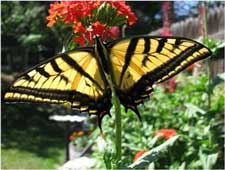
Flowers for a butterfly garden |
|
Milkweed |
Daisies |
Asters |
Impatiens |
Sunflowers |
Butterfly Weed |
Yarrow |
Lilies |
Butterfly Bush |
Irises |
Purple Passionflower |
Pentas |
- Attract birds to your garden: Plant vines with flowers that produce a lot of nectar attractive to hummingbirds. You can also plant shrubs and vines that produce berries as food for Florida songbirds.
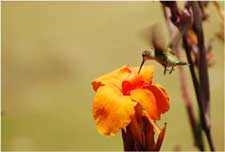
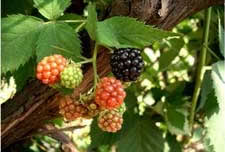
You should not use insecticides or herbicides in your campus garden especially if you are growing vegetables to eat or have children that play in the garden. These chemicals, when not used properly, can be dangerous and have both human and environmental health risks. If you notice weeds or pests in your garden, you can take care of the problem by following these tips:
- Pick weeds by hand: You can probably pull all the weeds out of your garden in a short amount of time.
- Use soap and water to kill pest insects: You can kill the insects that are damaging your flowers or vegetables by mixing a small amount of dishwashing liquid with water and spraying it on the insects. Be careful not to use too much soap because a large amount can burn the plant. We recommend using ½ teaspoon of dishwashing liquid per cup of water on plants, a 1% solution.
- A small number of pests will not do much damage: If you notice only a few pests in your garden there is no need to worry. You can simply ignore them or you can pick them off your plants by hand.
- Keep your garden maintained: If you let your garden get out of control and cluttered, pests will have plenty of hiding places and can find ways into your apartment. Pruning shrubs away from the building and keeping the garden clutter free will reduce the number of pests.

- Do not use wood: Wood used on the ground for planters, dividers, or other ornamental purposes can become infested with termites. Termites can easily move from the wood in a garden to the wood in an apartment. By removing wood in the gardens, you eliminate a food source for termites. Use plastic or terra cotta pots and build any raised gardens with stone, concrete blocks, or bricks.



